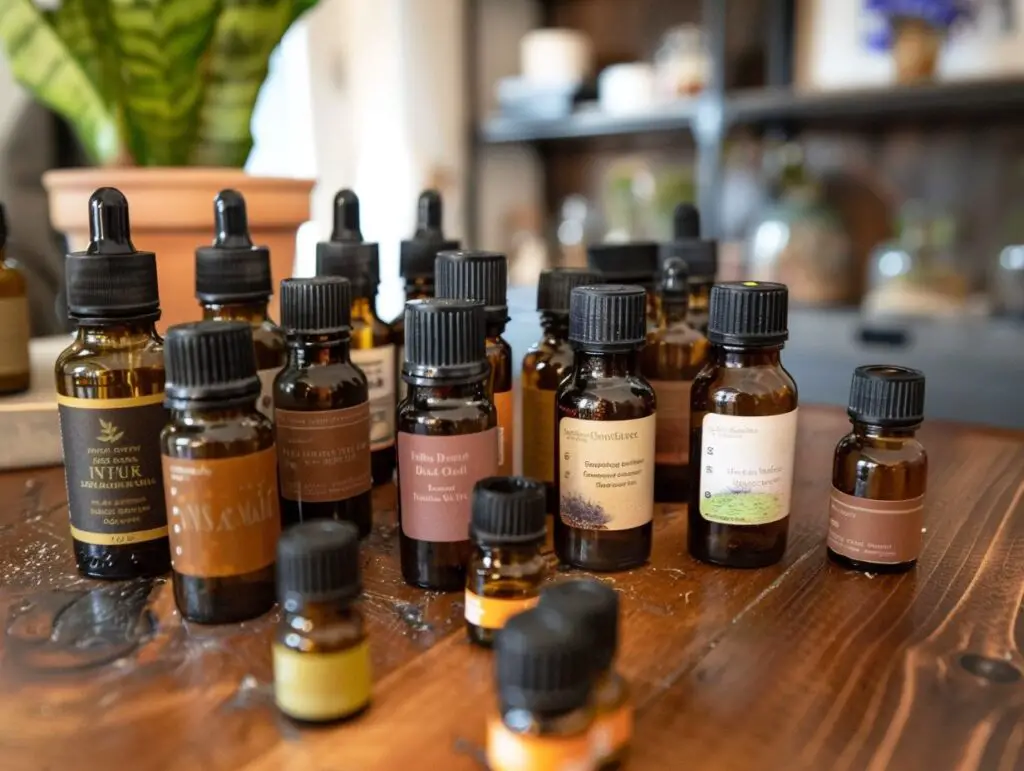As you set out on a gluten-free journey, you may find yourself wondering: what’s the missing piece to ideal digestive health? The answer lies in the potent world of essential oils. By incorporating these natural wonders into your daily routine, you can bid farewell to bloating, nausea, and inflammation, and hello to a harmonious gut. But which oils reign supreme in promoting digestive comfort and gut health? The journey to discovering the perfect blend begins now, and the benefits are waiting to be revealed.
Key Takeaways
- Essential oils like peppermint, ginger, and fennel can alleviate digestive discomfort, bloating, and nausea associated with a gluten-free diet.
- Frankincense and turmeric oils have potent anti-inflammatory properties that can reduce inflammation and alleviate symptoms of gluten intolerance.
- Certain essential oils, such as tea tree, oregano, thyme, and geranium, can boost immune system function and combat infections.
- Essential oils can be used topically, added to a carrier oil, or taken internally as supplements to promote digestive harmony and reduce inflammation.
- Always dilute essential oils in a carrier oil, perform a patch test, and use them in moderation to avoid adverse reactions.
Oils for Digestive Comfort

When adopting a gluten-free diet, your digestive system may take some time to adapt, leading to discomfort and unease.
This shift can be challenging, but essential oils can help alleviate symptoms and promote digestive harmony.
You may experience oil interactions that can soothe or irritate your digestive system.
For instance, peppermint oil can calm digestive spasms, while ginger oil can reduce nausea and inflammation.
On the other hand, some oils like clove oil can be too intense and cause discomfort.
It’s vital to understand how different oils interact with your body to achieve ideal digestive comfort.
To promote digestive harmony, start by incorporating gentle oils like fennel or coriander into your daily routine.
These oils can help reduce bloating, cramps, and other discomforts associated with gluten-free diet adjustments.
Reducing Inflammation Naturally
Adapting to a gluten-free diet can be a complex process, and inflammation is often an unwelcome companion.
You may experience it as joint pain, skin rashes, or digestive discomfort. As you navigate this new diet, it is crucial to find natural remedies to reduce inflammation and promote overall well-being.
Essential oils can be a valuable addition to your anti-inflammatory toolkit. Certain oils, such as frankincense and turmeric, have potent anti-inflammatory properties that can help mitigate inflammatory responses in the body.
You can use these oils topically, adding a few drops to a carrier oil like coconut or jojoba, or take them internally as supplements.
When choosing essential oils, look for high-quality, pure oils that are free of additives and chemicals.
Always dilute the oils in a carrier oil and perform a patch test before using them on your skin.
Soothing Gut Issues Quickly

When you’re dealing with gluten intolerance or sensitivity, your gut can take a beating.
You’re likely no stranger to discomfort, bloating, and digestive issues.
Fortunately, certain essential oils possess gut-soothing properties that can help reduce inflammation and boost your digestive health.
Gut Soothing Properties
Dig into a gluten-free diet and you’ll likely encounter some gut-wrenching issues – literally.
As you eliminate gluten, your gut may protest with bloating, cramps, and discomfort. But don’t worry, essential oils can be your gut’s new best friend.
Certain oils, known as gut calmers, can help soothe and calm your digestive system, promoting digestive harmony.
Peppermint oil, for instance, has natural anti-inflammatory properties that can ease digestive discomfort and reduce spasms in the digestive tract.
Ginger oil can also help alleviate nausea and digestive upset, while Fennel oil can reduce bloating and gas.
When used in combination, these oils can create a powerful synergistic effect, helping your gut heal and function at its highest efficiency.
Inflammation Reduction Methods
With gluten out of the picture, your gut may still be firing off inflammatory signals, leading to discomfort, pain, and general gut unrest.
This is often because other food triggers are still present, causing your gut to react. Identifying and addressing these triggers is vital in reducing inflammation.
One effective way to do this is by implementing healing protocols that focus on soothing and calming your gut.
Essential oils can play a significant role in these protocols. Certain oils, such as peppermint and ginger, have natural anti-inflammatory properties that can help reduce inflammation and alleviate discomfort.
They can be used in various ways, including internal supplements, topical application, or even aromatherapy.
Digestive Health Boost
Tackle digestive issues head-on by harnessing the power of essential oils to soothe and calm your gut. You know how frustrating it can be to experience bloating, cramps, and discomfort after eating. By incorporating essential oils into your daily routine, you can promote a healthy gut balance and reduce the severity of food triggers.
| Essential Oil | Benefits for Digestive Health |
|---|---|
| Peppermint | Relieves cramps, bloating, and gas |
| Ginger | Reduces inflammation and nausea |
| Fennel | Eases digestion and relieves bloating |
| Lavender | Calms the gut and reduces anxiety |
When your gut is out of balance, even the slightest food triggers can cause discomfort. By using these essential oils, you can quickly soothe and calm your gut, promoting a healthy balance. Add a few drops of peppermint oil to your water, or take a ginger capsule before meals to reduce inflammation. You can even diffuse fennel oil after dinner to ease digestion. By incorporating these essential oils into your daily routine, you’ll be better equipped to handle food triggers and maintain a healthy gut balance.
Essential Oils for Gut Health
Maintaining a healthy gut is crucial for overall wellness, and essential oils can play a significant role in supporting your gut health.
As you adopt a gluten-free diet, you may experience an imbalance in your gut microbiome, leading to digestive issues and discomfort.
Essential oils can help restore balance and promote gut healing. Peppermint oil, for instance, has natural anti-inflammatory properties that can soothe the digestive tract and reduce inflammation.
It can also help regulate the gut microbiome, promoting a healthy balance of good bacteria. Frankincense oil has been shown to reduce inflammation and improve gut permeability, allowing for better nutrient absorption.
Ginger oil can aid in digestion and reduce nausea, while also supporting the growth of beneficial gut bacteria.
Managing Gluten Symptoms Effectively

When you’re managing gluten symptoms, you’re likely looking for ways to reduce inflammation and soothe digestive discomfort.
You’re not alone – many people struggle with these issues, and essential oils can offer a natural solution.
Reducing Inflammation Naturally
Your body’s inflammatory response can be a significant hurdle to overcome when switching to a gluten-free diet. As you eliminate gluten from your diet, you may experience inflammation, which can lead to discomfort, fatigue, and skin issues. Fortunately, there are natural remedies that can help reduce inflammation and alleviate these symptoms.
Turmeric, in particular, has been shown to have potent anti-inflammatory properties. The active compound curcumin has been found to reduce inflammation by blocking inflammatory enzymes and reducing oxidative stress. Other essential oils, such as ginger and frankincense, also have anti-inflammatory properties that can help soothe and calm the body.
Here is a table highlighting some of the essential oils that can help reduce inflammation:
| Essential Oil | Benefits | Uses |
|---|---|---|
| Turmeric | Reduces inflammation, improves joint health | Add to food, take as supplement, or use topically |
| Ginger | Reduces inflammation, alleviates nausea | Take as tea, add to food, or use topically |
| Frankincense | Reduces inflammation, improves skin health | Use topically, add to skincare products |
| Peppermint | Reduces inflammation, alleviates digestive issues | Take as tea, add to food, or use topically |
| Lavender | Reduces stress, promotes relaxation | Use in aromatherapy, add to bath water |
Soothing Digestive Discomfort
As you work to reduce inflammation, you’ll likely notice improvements in your overall digestive health, which is especially important when managing gluten symptoms.
Soothing digestive discomfort is a vital step in achieving gut harmony and promoting digestive ease.
Essential oils can play a significant role in this process. Peppermint oil, for instance, has natural anti-inflammatory properties that can help calm the digestive system and reduce symptoms like bloating and cramps.
Ginger oil has a similar effect, and its warming properties can help soothe an upset stomach.
When used in combination, these oils can provide significant relief from digestive discomfort.
To use them, try adding a few drops to a warm bath or inhaling them through steam inhalation.
You can also add them to your food or take them in supplement form.
Boosting Immune System Function
Maintaining a healthy immune system is essential for anyone, but it’s especially pivotal for those following a gluten-free diet, as their bodies may be more prone to inflammation and nutrient deficiencies.
You may be more susceptible to immune response triggers, which can lead to autoimmune disorders. Fortunately, essential oils can provide autoimmune support and help boost your immune system function.
- Tea Tree oil: Known for its antimicrobial properties, Tea Tree oil can help combat infections and promote healthy immune function.
- Oregano oil: Rich in antioxidants, Oregano oil can help reduce inflammation and support immune response.
- Thyme oil: Thyme oil has natural antibacterial properties that can help fight off infections and support immune system function.
- Geranium oil: Geranium oil has antiviral properties that can help boost your immune system and reduce inflammation.
- Frankincense oil: Frankincense oil has anti-inflammatory properties that can help reduce inflammation and promote healthy immune function.
Frequently Asked Questions: Are Essential Oils Gluten Free Diet

Can Essential Oils Replace Medical Treatment for Gluten Intolerance?
You’re wondering if natural alternatives can replace medical treatment for gluten intolerance. While holistic approaches can complement traditional care, crucial to consult a healthcare professional before relying solely on alternatives, as they shouldn’t replace proven medical treatments.
Are All Essential Oils Suitable for Children With Gluten Issues?
When considering essential oils for sensitive kids, you’ll want to choose gluten-friendly blends, as some oils can be irritating or even contaminated with gluten, so always research and consult with a healthcare professional before using them.
How Do I Store Essential Oils to Maintain Their Potency?
You’re basically a superhero when it comes to storing essential oils – imagine a million tiny potency-protecting shields! Place them on an Oil Shelf in a Cool Dark spot, like a pantry or cupboard, to keep them fresh and mighty for a longer period.
Can I Use Essential Oils While Taking Gluten-Free Medications?
When taking medications, you’ll want to guarantee they’re absorbed properly. Using essential oils concurrently may not affect medication absorption, but be cautious of cross-contamination risks from shared equipment or surfaces, and consult your doctor or pharmacist to confirm safe usage.
Do Essential Oils Interact With Gluten-Free Supplements Negatively?
You’re wondering if essential oils negatively interact with your gluten-free supplements. Generally, high-quality oils won’t hinder gluten absorption rates, but poor oil quality control can lead to contaminants that might affect supplement efficacy – so choose reputable brands!
Conclusion
As you incorporate essential oils into your gluten-free diet, you’ll be joining the 1 in 5 Americans who’ve turned to alternative therapies to manage their digestive issues. Imagine your gut healing and functioning at its best, with reduced inflammation and improved nutrient absorption. By harnessing the power of peppermint, ginger, fennel, and frankincense oils, you can take control of your digestive comfort and overall well-being, revealing a life free from gluten-related symptoms.














